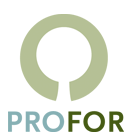PROFOR published the results of a series of studies on challenges faced by REDD+ initiatives in channeling benefits to forest dependent communities.
The first part of the brief provides guidance on how to implement benefit sharing when there are multiple systems of rights.
The second part presents the four fundamental building blocks of a benefit sharing mechanism.
The last part shows that well-thought benefit sharing mechanisms can change people's behavior.
 April 2012: The multi-donor Program on Forests Partnership (PROFOR) has published a brief on benefits sharing arrangements in initiatives for REDD+ (reducing emissions from deforestation and forest degradation, and conservation, sustainable management of forests and enhancement of carbon stocks). The brief focuses on how to identify beneficiaries when rights are unclear and how to transfer benefits. The brief also features examples of benefit sharing in practice.
April 2012: The multi-donor Program on Forests Partnership (PROFOR) has published a brief on benefits sharing arrangements in initiatives for REDD+ (reducing emissions from deforestation and forest degradation, and conservation, sustainable management of forests and enhancement of carbon stocks). The brief focuses on how to identify beneficiaries when rights are unclear and how to transfer benefits. The brief also features examples of benefit sharing in practice.
Titled “Making Benefit Sharing Arrangements Work for Forest-Dependent Communities: Insights for REDD Initiatives,” the brief looks into benefit sharing arrangements between local communities and outside partners. The first part of the brief provides guidance on how to implement benefit sharing when there are multiple systems of rights and discusses the role of contracts in benefit sharing arrangements when rights to resources are unclear. The second part presents the four fundamental building blocks of a benefit sharing mechanism and provides guidance on how to select the right mechanism in a given country context. An interactive tool (based on Excel) guides users through the decision making process. The last part shows that well-thought benefit sharing mechanisms can change people’s behavior. It stresses that the most effective systems evolve over time to deliver greater benefits to local partners.
The brief concludes that there is promise of an effective benefit sharing mechanism, although certain challenges must be overcome. It addresses these challenges by looking at unclear rights issues in Brazil and Ethiopia, and benefit sharing arrangements in practice in Nicaragua, Tanzania, and Uganda. Overall, the brief highlights the importance of transparency and oversight mechanisms to ensure benefits are actually shared with forest-dependent communities.
The World Bank houses PROFOR’s Secretariat. [Publication: Making Benefit Sharing Arrangements Work for Forest-Dependent Communities: Insights for REDD Initiatives]